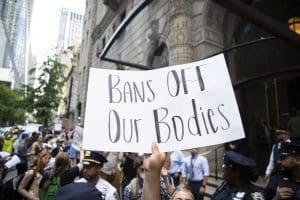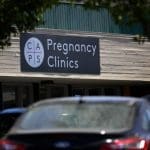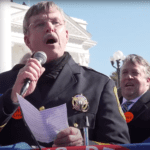The Federalist Society turns to states like Ohio in its fight against abortion rights
The Ohio Supreme Court has a 4-3 Republican majority, and three of the four conservative justices have deep ties to the Federalist Society.

When the Supreme Court overturned Roe v. Wade, its 1973 landmark ruling that affirmed Americans’ constitutional right to an abortion, it was a moment that had been decades in the making. And the organization that played a leading role in laying the groundwork for the court’s decision in Dobbs v. Jackson Women’s Health Organization that overturned Roe continues to push its broader agenda in such states as Ohio, where it is working to make abortion illegal.
As Ilyse Hogue, former president of the abortion rights group NARAL Pro-Choice America, noted in a story adapted from her book on the movement to abolish abortion rights, “The Lie That Binds,” a great deal of the push to overturn Roe was organized by the Federalist Society, a right-wing organization founded in 1982. Hogue notes that as society was changing and more political power was seen to be transferred to those who were not the white Christian men who had held it since before the founding of the country, “They didn’t have public opinion on their side — certainly not on legal abortion, nor on other elements of their plan to maintain their privilege and power. In order to implement their anti-democratic policy agenda and political philosophy, they needed the influence and power of a court system impervious to the will of voters.”
The Federalist Society, Hogue says, was “a new effort to train and promote conservative-minded lawyers into prominent positions, with an eye toward installing far-right judges. … [I]t found that abortion proved to be an excellent litmus test for likely members of the radical right. It turned out that young and ambitious legal minds who had an antipathy to Roe v. Wade were far more likely to be on board with the full agenda to assert control and maintain the status quo of right-wing power.”
Michael Kruse wrote for Politico in 2018, prior to the confirmation of President Donald Trump’s Supreme Court nominee Brett Kavanaugh:
In the 36 years since, it has become one of the most influential legal organizations in history—not only shaping law students’ thinking but changing American society itself by deliberately, diligently shifting the country’s judiciary to the right. Its members filtered into presidential administrations and federal courts. Robert Bork, one of the featured speakers at that first symposium, was nominated to the Supreme Court, and, although he wasn’t confirmed, another big-name speaker from that weekend later was: Antonin Scalia, who would anchor the Supreme Court’s conservative wing. Today, a remarkable four of nine of the country’s top justices have Federalist Society ties, and the confirmation of Brett Kavanaugh—literally picked from a list given to President Donald Trump by the organization’s executive vice president—would make five.
And now that the future of abortion access is in the hands of the states, the Federalist Society is setting its sights on state supreme courts, utilizing its network and resources to ensure a majority of state supreme court justices are aligned with its conservative values. As Notre Dame Law School’s Sherif Girgis, a member of the Federalist Society since law school, told the New Yorker’s Emma Green for her article “How the Federalist Society Won”: “[T]he legal nerd in me is intrigued by the very difficult and mostly unsettled legal questions about the kinds of policies that states are likely to pursue … [These questions have taken on] a new practical urgency, and there’s not a ton of law on some of them. That combination is exciting for me. Because it means that your expertise is both needed and practically relevant.”
The effort is especially pronounced in Ohio, where two of the state’s Supreme Court justices are running for reelection, and a third open-seat race will fill an impending vacancy on the seven-person court.
The outcome of these three races will directly affect the future of abortion access in Ohio. Immediately after Roe was overturned, an Ohio law banning abortion after six weeks’ gestation went into effect. Attorneys representing the state’s abortion providers sued to restore access, and the case is waiting to be heard by the Supreme Court, but the outcome of November’s elections could determine how the court rules. A recent Suffolk University/Cincinnati Enquirer poll found that a majority of likely midterm voters in Ohio want see abortion rights protected.
Currently, the Ohio Supreme Court has a 4-3 Republican majority, and three of the four conservative justices have deep ties to the Federalist Society.
Pat DeWine and Pat Fischer, who are both running for reelection, are both listed as contributors on the Federalist Society’s website. DeWine, who is also the son of Ohio Republican Gov. Mike DeWine, participated in Federalist Society-sponsored events during his candidacy in 2016 and often refers to his involvement with the organization on Twitter.
Fischer too participated in Federalist Society events when he was a candidate for Ohio’s highest court in 2016, as has continued to do so since he was elected. In July 2021, Fischer was a speaker at a Federalist Society event in Cincinnati called “The Relationship Between Our State and Federal Constitutions.”
Sharon Kennedy, a sitting justice who is running to fill the impending vacancy left by Chief Justice Maureen O’Connor, who is set to retire after this year, participates in Federalist Society events and frequently mentions her involvement with the organization.
But the Federalist Society’s influence in Ohio’s judiciary branch doesn’t end with the state Supreme Court. Ohio Attorney General David Yost is also listed as a contributor on the Federalist Society’s website and has repeatedly mentioned his involvement with the organization. After Roe was overturned, Yost hurried to file a motion to dissolve a federal court injunction that had been placed in 2019 on the state’s recently passed and misnamed “Heartbeat Protection Act,” which prohibits abortion as soon as what is incorrectly referred to as a “fetal heartbeat” is detected. As doctors note, there is no heart in an embryo when electrical activity right-wing lawmakers incorrectly call a “heartbeat” can be picked up by an ultrasound. state abortion ban that passed in 2019; the motion was granted. The law remains under legal challenge, but has been allowed to take effect.
Yost drew widespread ire in July when he questioned the veracity of a story of a 10-year-old Ohio girl who was allegedly raped and had to travel to Indiana to get an abortion because of the Ohio abortion ban that he championed. Shortly after Yost cast doubt on the story, a 27-year-old man was arrested and charged with rape. The Democratic Party of Ohio has since called on Yost to resign.
Published with permission of The American Independent Foundation.
Recommended

New NC GOP chair flirts with bogus stolen election conspiracies
Simmons predecessor was a staunch 2020 election denier
By Jesse Valentine - April 19, 2024
Texas activists pushed abortion restrictions in NM cities and counties, records show
Emails reveal influence and control in exchange for promises of legal help
By Austin Fisher, Source NM - March 04, 2024
Cannabis workers across Missouri begin push to unionize dispensaries
The first day was a breeze. Sean Shannon and Danny Foster walked into several marijuana dispensaries around Missouri with their matching “Union For Cannabis Workers” shirts and talked to employees about the possibility of unionizing. “The first day, there were 57 stops amongst the teams,” said Shannon, lead organizer with UFCW Local 655, which actually […]
By Rebecca Rivas - December 04, 2023









































































